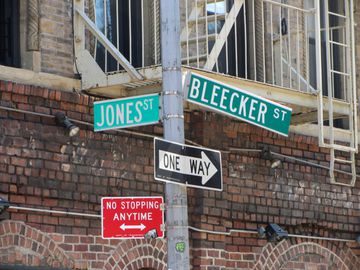

Named after Anthony Bleecker, lawyer, author and one of New York's most distinguished early-19th-century residents, Bleecker Street is the most popular artery in Greenwich Village. Running one-way from west to east, it starts at 8th Avenue and finishes at the Bowery. However the most vibrant part has always between 8th Avenue and Broadway, since it is there that the most famous Greenwich nightclubs once stood, and some still stand.
The Village Gate was one of those clubs. Although it was not the oldest jazz club in the neighborhood - the Village Vanguard on 7th Avenue was - the Village Gate was surely the most particular, because it did not only feature jazz performances. It also offered intimate rock and folk concerts, comedy standups, poetry readings and even a couple of very famous but short-lived shows.
Opened in 1958, the Village Gate provided the stage for all the jazz legends: John Coltrane, Billie Holiday, Duke Ellington, Dizzy Gillespie, Miles Davis, Dave Brubeck, Aretha Franklin, Stan Getz, Tito Puente and others. Rock star Jimi Hendrix and poet Allen Ginsberg made frequent appearances in the 60s. In 1968 the musical show Jacques Brel is Alive and Well and Living in Paris, telling the story of renowned Belgian singer Jacques Brel, was put on at the Village Gate, immediately becoming an international success. It ran until 1974, when it was taken to other locations in the city. It was followed by the show Let My People Come, glorifying the sexual revolution, which was also a bit hit, not only in New York but also worldwide. Comedians such as John Belushi and Chevy Chase also had their start at the Village Gate in the show National Lampoon's Lemmings. The club, due to a drastic change in social tastes and trends, closed its doors permanently in 1993 and the ground floor was turned into a pharmacy.
Further down the street, on the other side of Thompson, at the address of 152 Bleecker once stood the Café au Go Go club, which in the late 60s featured all the great rock bands and solo rockers: the Grateful Dead, Van Morrison, Jefferson Airplane, Muddy Waters, John Lee Hooker, Cream and others.
A club that still operates today is the Bitter End rock club, on the other side of Bleecker Street, between Thompson and LaGuardia. Since its opening in 1961, it has featured the most important American performers in rock history, especially those from the East Coast. However, because it always diversified its acts, instead of concentrating on a few particular stars, it has outlived almost all of its competitors in the neighborhood.
No doubt Bleecker Street, just like Greenwich Village itself, has lost its eccentric and rebellious aura. Friday and Saturday nights are not as exciting as they were forty or even thirty years ago. Or better, they are not as melodic. Most of today's pop songwriters and musicians no longer have a message; they no longer play to transport the audience to a particular frame of mind. They play just for the fun of playing, or just for supporting a waning tradition, which is why the music they write sounds uninspired. The other theory is that there is nothing to protest against anymore. Individual liberties in America have all been guaranteed by now. The soul does not feel restricted, which is not always good for creativity.
Whichever theory is right, the villagers know that it will be a long time before anyone bursts onto the music scene with an entirely new musical art.